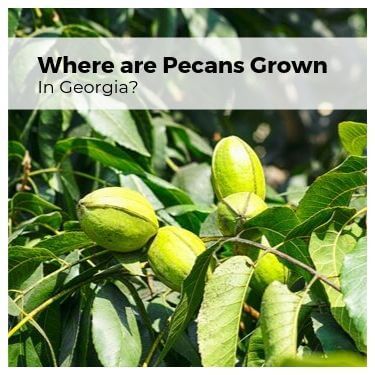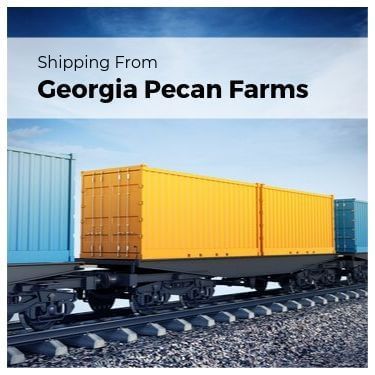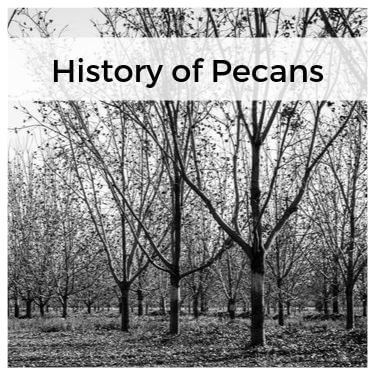Shipping from Georgia pecan farms is big business. For Georgia pecan farms and pecan production facilities, growing this popular nut is only one aspect of running a profitable business. After harvesting and running pecans through quality control, pecans must still go through a lengthy shipping and processing journey. Effective shipping is a must or farmers seeking ways to reduce business costs and increase their overall profits. But optimizing this process can be a difficult problem to solve. As freight and shipping logistics have refined over time, shipping pecans from Georgia can be intimidating for growing farm operations.
To implement effective shipping from Georgia pecan farms, it is essential to understand the pecan business as a whole. Why pecans are grown in Georgia, how to store pecans, how to package them for shipping, key health benefits of this hardy nut and more are key for understanding the pecan business. This article’s introduction to this unique industry will help anyone interested in Georgia pecan farming on their way to business success.
While they are grown in many places, the majority of pecans are grown in the United States and Mexico. The U.S. is the top producer of pecans for the word, producing on average between 250 and 300 million pounds annually. When combined with Mexico, the two countries account for more than 90% of global pecan production.
Pecans are grown throughout many states in the southern U.S. While Alabama, Arkansas, Arizona, California, Florida, Kansas, Louisiana, Missouri, Mississippi, North Carolina, New Mexico, Oklahoma, South Carolina, and Texas all produce pecans, Georgia is the top producing state. Georgia pecans make up roughly one-third of all pecans produced in the US and on average produce around 88 million pounds of the nut each year.
Do you need freight shipping from Alabama from California for your pecans? What about freight shipping from Louisiana to Florida? See how an expert freight partner can help move these nuts and more.
Growing pecans requires patience! It can take up to 10 years for a pecan tree to begin producing a full crop of nuts for harvest. But the wait is worth it - pecan trees can produce crops at those rates for decades. Some pecan trees have even been productive for more than 100 years.
While Georgia is known for its peaches, pecans make up a large portion of its land usage and industry. You can find pecan orchards in just about any part of the state, but southwest Georgia is the main center of Georgia pecan farming. Orchards are concentrated around Albany in Dougherty and Mitchell counties, where the trees grew in popularity in the early 1900s.
Learn more about shipping Georgia peaches.
The popularity of pecan farming continues to grow; more than 20,000 acres of pecan trees were added between 2012 and 2017 as more entrepreneurs entered the pecan market. All of that land expansion means that there are increased demands for irrigation to water the sometimes temperamental crop.

Other challenges facing Georgia pecan farmers include:
For those farmers seeking to maximize the return on their investment, pecans can be quite challenging. While in high demand, the crops require consistent moisture for proper growth. This means larger operations require larger water supplies and more complex equipment to complete irrigation. Those Georgia farmers who can properly irrigate their pecan orchards and protect against risks of pests and diseases will see successful crops.
The majority of U.S. pecans are produced in Georgia for two reasons: climate and history. Georgia’s natural aspects Pecans are produced in these southern areas because they grow best in long summers with high temperatures and plenty of humidity. Plenty of Georgia sunshine with good moving air and soil that is porous, rich, and well-drained is essential for producing strong crops. Due to irrigation requirements, the relatively high amounts of annual rainfall in Georgia can help in establishing healthy pecan trees.
Beyond Georgia’s natural climate being ideal, the state has a long history of love for pecans. A “pecan boom” swept the state beginning in 1910 that saw real estate developed with pecan trees planted on the property. These farms and homes grew in popularity and helped to establish pecans as part of the Georgia landscape. As time went on, pecans became a more commercial venture, but the popularity of both the tree and its healthy nut has stayed consistent in Georgia.
Pecan farmers in Georgia looking for ways to ship their crops out of the state have many options. Georgia is a hub for overland, freight rail, air, and sea transport. After identifying the proper partner for shipping their pecans, farmers can quickly and easily get their crops virtually anywhere in the US or around the world.
For overland routes, pecan farmers can opt for traditional overland or truckload shipping. Interstate I-85 offers access to large north-south routes via connections with I-65 in Alabama or I-95 in Virginia. I-20 stretches from I-95 all the way to I-10 in West Texas, offering a clear route west. And I-75 offers a major north-south route stretching from Florida all the way to Michigan’s upper peninsula. The climate control available in some tractor-trailers make overland one of the most popular options for shipping Georgia pecans.
For rail transport, major trail transporters maintain railways in Georgia. Their lengthy rails and major hubs offer ease of transport across most of the continental U.S. and can be a strong option for pecan shipping.

For international options, Atlanta International airport offers access around the world for pecan distribution. The speed of delivery can be a strong quality for consideration when selecting how to ship pecans. One other international option available in Georgia is the seaport of Savannah, which offers access to sea routes for trade.
We’ll discuss shipping and packaging requirements for pecans in the next section. However, when selecting the best method for transporting your pecan crop, it’s important to consider the following:
For busy pecan operations, trusting a logistics and supply chain management partner can often make the most sense. By letting them optimize your shipping strategy, you can focus on producing the best crops possible and trust that your interests and concerns are considered when selecting all options for shipping Georgia pecans.
Pecan shipping requirements vary based on both the type of nut and whether they’ve already been processed. Shipping certain varieties in their shell can reduce risks to pecan crops, as the shell offers natural protection in transit. However, this can reduce your overall profit margins, as it requires outsourcing to a pecan processor. In-shell pecans also still require adequate environmental controls to manage both temperature and moisture in order to prevent spoilage.
Pecan nuts that have been shelled or the popular “paper-shell” variety require gentler handling and more controls. Breakage can reduce profit margins and divert your shipment’s quality to a different processor. Maintaining pecans in their whole-nut condition will fetch the greatest price, as these are more desirable to consumers. It’s also important to keep them cool and dry to avoid pests, mold, and spoiling.
Whether shipping by road, rail, boat, or plane, pecans require climate-controlled shipping and proper packaging to reduce damage. Keeping pecan nuts whole is essential for your product’s value. By selecting the most effective options with a shipping and logistics partner, you will be the most effective.
Proper pecan storage is essential both before and after shipping. The requirements are very similar to those required for shipping, but the long-term solutions create additional challenges for pecan producers.
Airtight storage of pecans is essential. This helps to cut down on exposure to moisture, pests, and other threats to the product quality. Cool and dry environments are key to preserving product quality. It’s so important that some Georgia pecan suppliers won’t ship their crops during particularly hot times of the year.
A growing trend of pecan storage includes freezing the crops. This meets the challenges laid out in the previous paragraph but does require more costs due to acquiring the proper equipment and electricity. It is also important to maintain backup power supplies for frozen crops. Pecans can be stored in refrigeration for roughly nine months and can be frozen for up to two years before use. One impressive thing about pecans is that they can be thawed and refrozen repeatedly without negatively impacting the texture or losing its distinctive flavor. After removing pecans from their frozen environment, they are typically viable for up to two months.
Thanks to growing strategies of storing and shipping pecans, this health nut is now available in stores almost year-round!
Pecans have rapidly grown in popularity because they are a healthy and nutritious nut. While chowing down on pecan pie is not healthy behavior, adding pecans to salads, wraps, baked goods, and more can increase your overall nutrition. Pecans are rich in nutrients, fiber, and healthy fats. In fact, pecans have the most fat content of any nut, primarily monounsaturated fatty acids that are essential for health.
Other health highlights of pecans include:
For those people looking for ways to improve their diets, pecans make a great snack. Thanks to their high fat and protein content, they offer a great way to keep people full and avoid snacking on unhealthy carbohydrates. While pecan pie isn’t a healthy option, other ways to bake and use pecans in your cooking are readily available online.
Pecans have a rich, varied, and long history in the United States. Long before European settler arrived, Native Americans consumed and traded the wild nuts. Thanks to the health benefits we explored in the previous section, pecans made for a great addition to their foragers’ diets. The hardiness of the shells meant that pecans from the previous growing season could still be eaten even when found on the ground in the next spring and summer.
After settlers arrived, Spaniards in Mexico, Louisiana, and Texas discovered pecans. They called them “nuez de la arruga,” which roughly translates to “wrinkle nut.” While originally mistaken for walnut trees, the nut was quickly differentiated in the late 1700s by early botanists. Settlers took pecans from the Americas around the world to Europe, Asia, and Africa via boat.
The popularity of pecans remained strong. Thomas Jefferson, in particular, seemed to be passionate about the native nut trees, planting them and sharing pecans with George Washington, who then cultivated the trees at his home in Virginia. As time went one, pecans found their ways throughout the southern states, where they are still cultivated and harvested to this day.

While a lucrative crop, pecans demand a lot to be properly produced. Beyond challenges in irrigation, protection against pests and disease, and threats of weather, the market is no certain thing. Growers must wait up to eight years before their trees even begin to produce pecans. For a growing operation, the additional logistics challenge of proper handling and shipping of their pecan nut harvest can be overwhelming.
It doesn’t have to be, however. Combining the best practices in this article with the right partner for shipping from Georgia pecan farms can help growers. By outsourcing the later logistics legs of their operation, farmers can focus on what they do best: growing pecans. Leaving the challenges of shipping and logistics to those industry experts means your pecan crops can find their way to the market faster and more effectively, saving you time and helping your profit margins in the process.
Shipping from Georgia pecan farms is easy with the right logistics partner We handle everything from Georgia peaches to Georgia red clay too. R+L Global Logistics has experience moving all kinds of food-grade products, from shipping cotton to Texas to dairy logistics. Let R+L Global Logistics offer solutions for your pecan shipping needs. Contact R+L Global Logistics today.
R+L Global Logistics
315 NE 14th St., Ocala, FL 34470